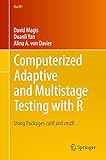Computerized Adaptive and Multistage Testing with R [electronic resource] : Using Packages catR and mstR / by David Magis, Duanli Yan, Alina A. von Davier.
Material type: TextSeries: Use R!Publisher: Cham : Springer International Publishing : Imprint: Springer, 2017Description: XX, 171 p. 20 illus. online resourceContent type:
TextSeries: Use R!Publisher: Cham : Springer International Publishing : Imprint: Springer, 2017Description: XX, 171 p. 20 illus. online resourceContent type: - text
- computer
- online resource
- 9783319692180
- Mathematical statistics
- Educational tests and measuremen
- Psychometrics
- Statistics
- Educational psychology
- Statistical Theory and Methods
- Assessment, Testing and Evaluation
- Psychometrics
- Statistics for Social Science, Behavorial Science, Education, Public Policy, and Law
- Statistics and Computing/Statistics Programs
- Educational Psychology
- 519.5 23
- QA276-280
Foreword -- Preface -- Ch 1 Overview of Adaptive Testing -- Ch 2 An Overview of Item Response Theory -- Part 1 Item-Level Computerized Adaptive Testing -- Ch 3 An Overview of Computerized Adaptive Testing -- Ch 4 Simulations of Computerized Adaptive Tests -- Ch 5 Examples of Simulations using catR -- Part 2 Computerized Multistage Testing -- Ch 6 An Overview of Computerized Multistage testing -- Ch 7 Simulations of Computerized Multistage Tests -- Ch 8 Examples of Simulations using mstR -- Index.
The goal of this guide and manual is to provide a practical and brief overview of the theory on computerized adaptive testing (CAT) and multistage testing (MST) and to illustrate the methodologies and applications using R open source language and several data examples. Implementation relies on the R packages catR and mstR that have been already or are being developed by the first author (with the team) and that include some of the newest research algorithms on the topic. The book covers many topics along with the R-code: the basics of R, theoretical overview of CAT and MST, CAT designs, CAT assembly methodologies, CAT simulations, catR package, CAT applications, MST designs, IRT-based MST methodologies, tree-based MST methodologies, mstR package, and MST applications. CAT has been used in many large-scale assessments over recent decades, and MST has become very popular in recent years. R open source language also has become one of the most useful tools for applications in almost all fields, including business and education. Though very useful and popular, R is a difficult language to learn, with a steep learning curve. Given the obvious need for but with the complex implementation of CAT and MST, it is very difficult for users to simulate or implement CAT and MST. Until this manual, there has been no book for users to design and use CAT and MST easily and without expense; i.e., by using the free R software. All examples and illustrations are generated using predefined scripts in R language, available for free download from the book's website. Provides exhaustive descriptions of CAT and MST processes in an R environment Guides users to simulate and implement CAT and MST using R for their applications Summarizes the latest developments and challenges of packages catR and mstR Provides R packages catR and mstR and illustrates to users how to do CAT and MST simulations and implementations using R David Magis, PhD, is Research Associate of the “Fonds de la Recherche Scientifique – FNRS” at the Department of Education, University of Liège, Belgium. His specialization is statistical methods in psychometrics, with special interest in item response theory, differential item functioning and computerized adaptive testing. His research interests include both theoretical and methodological development as well as open source implementation and dissemination in R. He is the main developer and maintainer of the packages catR and mstR, among others. Duanli Yan, PhD, is Manager of Data Analysis and Computational Research for Automated Scoring group in the Research and Development division at the Educational Testing Service (ETS). She is also an Adjunct Professor at Rutgers University. Dr. Yan has been the statistical coordinator for the EXADEP™ test, and the TOEIC® Institutional programs, a Development Scientist for innovative research applications, and a Psychometrician for several operational programs. Dr. Yan received many awards, including the 2011 ETS Presidential Award, the 2013 NCME Brenda Lyod award, and the 2015 IACAT Early Career Award. She is a co-editor for Computerized Multistage Testing: Theory and Applications and a co-author for Bayesian Networks in Educational Assessment. Alina A. von Davier, PhD, is Senior Research Director of the Computational Psychometrics Research Center at Educational Testing Service (ETS) and an Adjunct Professor at Fordham University. At ETS she leads the Computational Psychometrics Research Center, where she is responsible for developing a team of experts and a psychometric research agenda in support of next generation assessments. Computational psychometrics, which include machine learning and data mining techniques, Bayesian inference methods, stochastic processes and psychometric models are the main set of tools employed in her current work. She also works with psychometric models applied to educational testing: test score equating methods, item response theory models, and adaptive testing. .
There are no comments on this title.



























